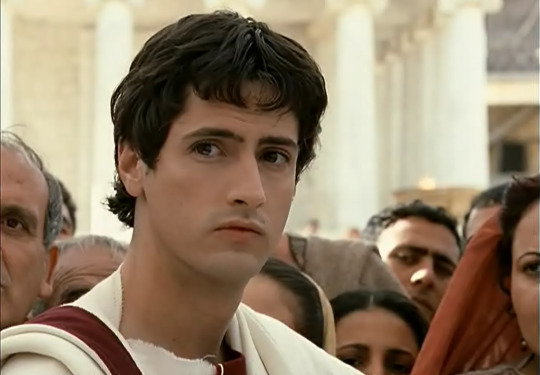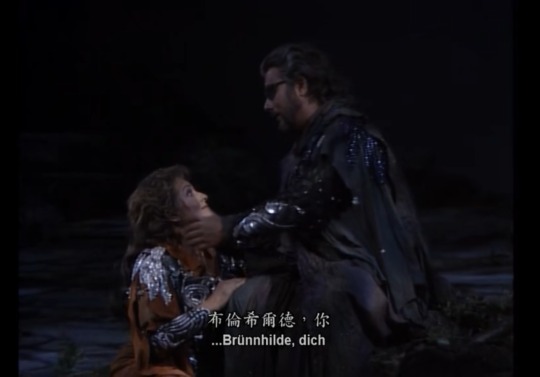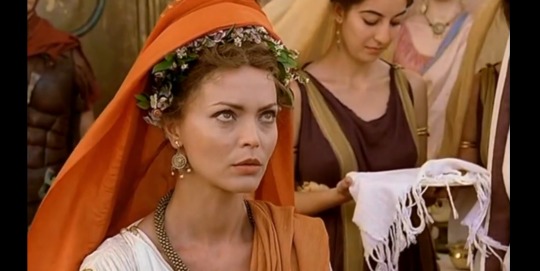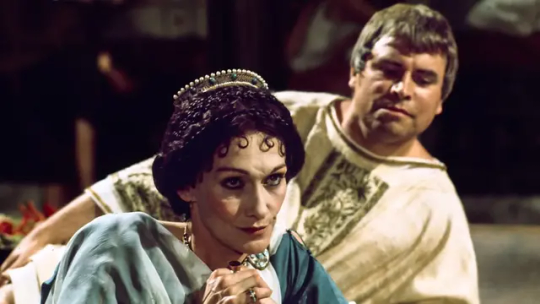#imperium augustus
Explore tagged Tumblr posts
Text
IULLUS ANTONIUS: Antony's only surviving son
He was the son of the Triumvir Mark Antony and his second wife Fulvia Flacca Bambula.
He was raised in his father's divorced wife Octavia's household after he was orphaned when his father committed suicide following his defeat at the battle of Actium in 30 BC.

Iullus was to leave for Alexandria along with this elder brother Marcus Antonius Antyllus according to their father's wishes sometime in 34 BC, but for reasons unknown, his stepmother Octavia only sent Antyllus and kept him with her.
Named after Julius Caesar by his father, Iullus married his stepsister Claudia Marcella Major after her divorce from Agrippa in 21 BC. He became praetor in 13 BC, consul in 10 BC and Asian proconsul in 7 BC and was said to be highly regarded by Augustus. He is mentioned by Horace in his own poetry where he speaks of an occasion when Iullus intended to write a higher kind of poetry praising Augustus for his alleged success in Gaul. Iullus was a poet and is credited with having written twelve volumes of poetry on Diomedia sometime before 13 BC, which were destroyed after his death.
Although when it began is unsure, Iullus became a lover of Julia the Elder. Marcus Agrippa died in 12 BC and Julia had been forced to remarry her stepbrother, Tiberius. Julia's marriage to her stepbrother had become a disaster and she was desperate to divorce him. Tiberius had left Rome in 8 BC leaving Julia and her five children by Agrippa, Gaius Caesar, Lucius Caesar, Julia the Younger, Agrippina the Elder, and Agrippa Postumus, in Rome. Julia felt that her children were unprotected and may have approached Iullus to be a protector for her children, especially her two elder sons, Gaius Caesar and Lucius Caesar, who were Augustus' joint heirs.
Tacitus censures Augustus in “calling, as he did, a vice so habitual among men and women by the awful name of sacrilege and treason, he went far beyond the indulgent spirit of our ancestors, beyond indeed his own legislation.”
In the telling of Cassius Dio:
when [Augustus] at length discovered that his daughter Julia was so dissolute in her conduct as actually to take part in revels and drinking bouts at night in the Forum and on the very rostra, he became exceedingly angry. He had surmised even before this time that she was not leading a straight life but refused to believe it. For those who hold positions of command, it appears, are acquainted with everything else better than with their own affairs; and although their own deeds do not escape the knowledge of their associates, they have no precise information regarding what their associates do. In the present instance, when Augustus learned what was going on, he gave way to a rage so violent that he could not keep the matter to himself but went so far as to communicate it to senate. As a result, Julia was banished to the island of Pandateria, lying off Campania, and her mother Scribonia voluntarily accompanied her. Of the men who had enjoyed her favours, Iullus Antonius, on the ground that his conduct had been prompted by designs upon the monarchy, was put to death along with other prominent persons, while the remainder were banished to islands. And since there was a tribune among them, he was not tried until he had completed his term of office. As a result of this affair many other women, too, were accused of similar behaviour, but the emperor would not entertain all the suits; instead, he set a definite date as a limit and forbade all prying into what had occurred previous to that time. For although in the case of his daughter he would show no mercy, remarking that he would rather have been Phoebe’s father than hers, he nevertheless was disposed to spare the rest. This Phoebe had been a freedwoman of Julia’s and her accomplice and had voluntarily taken her own life before she could be punished. It was for this that Augustus praised her.
Both contemporary and modern historians have suggested Iullus had designs upon the monarchy and wanted to marry Julia before her children Gaius and Lucius came of age possibly to form some sort of regency. Although no substantial evidence was ever provided by Augustus for such a claim. It is possible that she planned to divorce Tiberius and make Iullus Antonius protector of her sons.
The scandal finally broke in 2 BC, Augustus took action on his daughter Julia's alleged promiscuity. Iullus was exposed as her prominent lover. The other men accused of adultery with Julia were exiled but Iullus was not so lucky. He was charged with treason and sentenced to death. He was either executed or according to Velleius Paterculus, died by his own hand rather than be humiliated by execution.
He had at least 3 children with Claudia Marcella, namely Iullus Antonius, Lucius Antonius and Iulla Antonia.
Image: Juan Diego Botto as Iullus Antonius in Imperium: Augustus
#iullus antonius#marcus antonius#mark antony#augustus#octavian#fulvia#rome#roman history#ancient rome#roman republic#roman empire#imperium augustus#tv shows
21 notes
·
View notes
Text
sincerely sorry for the continued imperiumposting but i can't get over this
#IM SO ILL#sick in the head sick sick sick s#the chokehold this objectively terrible movie has on me???? stop??#imperium augustus#they should eat each other !!#imperiumposting
30 notes
·
View notes
Text





















Julia Caesaris, daughter of the Empire
"Through the wind and the rain She stands hard as a stone In her world that she can rise above"
Martina McBride - Concrete Angel
#imperium augustus#julia#augustus#ancient rome#roman empire#I know the movie is mediocre at best but she's my favorite portrayal of julia#peter o'toole#vittoria belvedere#periodramaedit#perioddramagif#ancientromeedit
3 notes
·
View notes
Text


Augustus and Livia in IMPERIUM: AUGUSTUS (2003)
#imperium: augustus#lux vide#octavian augustus#benjamin sadler#peter o'toole#livia drusilla#martina stella#charlotte rampling#augustus x livia#then and now#ancient rome#period drama#stills
118 notes
·
View notes
Text








16 November: Emperor Tiberius was born in 42 BC. Here are some of his portrayals on screen:
André Morell in The Caesars (1968) George Baker in I, Claudius (1976) Peter O'Toole in Caligula (1979) James Mason in AD (1985) Michele Bevilacqua in Imperium: Augustus (2003) Max von Sydow in The Final Inquiry (2006) Giovanni Carta in Barbarians (2020) Benjamin Isaac in Domina (2021)
#emperor tiberius#tiberius julius caesar augustus#the caesars (1968)#i claudius#caligula 1979#ad (1985 miniseries)#imperium: augustus#august: the first emperor#the final inquiry#netlix barbarians#domina sky#tbh andré morell is probably the best#funny thing: peter o'toole got to play both tiberius and augustus#not sure about barbarians tiberius#he seems way too smarmy#the only complaint i have about domina is that “bad Tiberius” personality#ancient rome
59 notes
·
View notes
Text
What a Livia!

8 notes
·
View notes
Text
Instrument of Your Father's Will
"Have I ever been anything but an instrument to fulfill your destiny!"
- Julia the Elder to Augustus, Imperium: Augustus
"Ha, Freche du! Frevelst du midi? Wer bist du, als meines Willens blind wählende Kür?"
- Wotan to Brünnhilde, Der Ring des Nibelungen
"Princess Saera watched from the window of her cell. Jonquil Darke, her gaoler, made certain that she did not turn away."
- Fire & Blood




#saera x jaehaerys#saehaerys#fire and blood#der ring des nibelungen#brunnhilde#wotan x brünnhilde#wotan#imperium: augustus#julia the elder#augustus#psychosexual my beloved
17 notes
·
View notes
Text
youtube
AUGUSTUS
Imperium: Augustus
2003
Imperium: Augustus is a British-Italian historic film which is part of the Imperium series. The film focuses on Ancient Rome and the life of Octavian and how he became Augustus. The film focuses on his youth as well as his later life. The film stars Peter O’Toole as Augustus and Charlotte Rampling as Livia. It was filmed in Tunisia, Africa.
#augustus #imperiumaugustus #imperiumseries #ancientrome #peterotoole
2 notes
·
View notes
Text
My friend (@helldava): You may leave the Teutoburg forest, but the Teutoburg forest does not leave you.
Me: You don't come out of the Teutoburg forest, my friend.
#not incorrect quotes#my quotes#spqr#rome#imperio romano#imperium#roman empire#augustus#teutoburg#teutoburg forest#roman#arminius#gaius julius arminius#latin#roma#history#barbarians#battle of teutoburg#germans#roman soldiers
10 notes
·
View notes
Text
#edit#video editing#Imperium: Augustus#augustus#octavian#marcus vipsanius agrippa#maecenas#augustus x agrippa#augustus x agrippa x maecenas
4 notes
·
View notes
Text
"For Rome, who had never consented to fear any nation or people, did in her time fear two human beings: one was Hannibal and the other was a woman."
~ W. W. Tarn, Cambridge Ancient History

Anna Valle as Cleopatra in Imperium: Augustus (2003)
#cleopatra#cleopatra vii#antony and cleopatra#Anna Valle#women#women in history#imperium augustus#augustus#ptolemaic egypt#ptolemaic dynasty#ancient history#ancient rome#roman republic#roman history#roman empire#rome#girl power#quotes#miniseries#mini series
60 notes
·
View notes
Text

him apples btw
#sorry still not over this movie#octavian#agrippa#look at my romans boy#imperium augustus#imperiumposting
16 notes
·
View notes
Text



Chaos turns our children against us. What kind of society are we if we punish youthful folly – serious though it is – with death, when all they believe they are doing is getting more food for the hungry? There will be those guiltier in that place. I will see them separated, and judged according to the relative severity of their error. Marneus Augustus Calgar- Dark Imperium -- Guy Haley
#i read this chapter yesterday#and really like his character#then again i seem to like the ultramarines#warhammer 40k#marneus calgar#ultramarines#40k mine#space marine 2
193 notes
·
View notes
Text




"Goodbye, Livia, never forget our wedding."
I, Claudius (1976) - Brian Blessed/Siân Phillips
Imperium: Augustus (2001) - Benjamin Sadler/Martina Stella
Rome (2005 - 2007) - Simon Wood/Alice Henley
Domina (2021 - 2023) - Matthew McNulty/Kasia Smutniak
#i claudius#imperium: augustus#rome hbo#domina sky#augustus x livia#imperial couple#ancient rome#julio claudian dynasty#tv series#livia drusilla#augustus
119 notes
·
View notes
Text

The Lyon Tablet, a transcript of the speech Emperor Claudius had given in the Senate in 48 AD, arguing for the admission of senators from Gaul.
1. I should say at the outset that I reject the first thought that will, I am sure, be the very first thing to stand in my way: namely that you will recoil from my suggestion as though I were introducing some revolutionary innovation. Think, instead, of how many changes have taken place over the years in this state and how many forms and constitutions our state has had, from the time of its very foundation.
2. At one time this city was held by kings, though they did not pass it along to successors from their own families. People from other families came to the throne and even some foreigners. Numa, for example, succeded Romulus, and was a Sabine; that made him a neighbor, certainly, but at the time he was also a foreigner. Another example is Tarquinius Priscus, who succeded Ancus Marcius: because of his impure blood--his father was the Corinthian Demaratus and his mother was from Tarquinii, to Tarquinius Priscus supposedly had a Greek father and an Etruscan mother. And though well-born she was very poor, which is why she was forced to marry such a husband.--Tarquinius was kept from positions of honor in his own land and thus emigrated to Rome, where he became king. Between Tarquinius and either his son or his grandson (for our authorities disagree on this point) there came Servius Tullius. And according to the Roman sources Servius Tullius had as a mother a prisoner of war, Ocresia; according to the Etruscans he had been the faithful companion of Caelius Vivenna and took part in his adventures, and later, when he was driven out by a change of fortune, he left Etruria with all the suriving troops of Caelius and seized the Caeliian hill, which thus takes its name from his leader Caelius, and after changing his name (for his Etruscan name was Mastarna) he was given the name I have already mentioned, and became king, to the very great advantage of the state. Then, after the behavior of Tarquinius Superbus came to be hated by our city--and not only his behavior but that of his sons--the people obviously became tired of monarchy, and the administration of state was transferred to the consuls, who were annual magistates.
3. Why need I mention the dictatorship--more powerful even than the consulship--which was what our ancestors came up with when wars were particularly hard or there was serious civil disturbance? Or why need I mention the the creation of tribunes of the plebs, to provide assistance for the plebs? Why mention transfer of imperium from consuls to the decemviri, and at the end of the reign of the decemviri the return of imperium back to the consuls? Why mention the distribution of the consular power to multiple recipients, called tribunes of the soldiers with consular power, who were first six and then eight in number? Why should I mention the fact that offices that were once patrician ones were shared eventually with the plebeians, religious ones as well as military?
4. If I were to tell of the wars, which our ancestors started with and which have continued down to the present day, I fear that I would appear too boastful, and look as though I wanted to boast about my glory in extending the empire beyond the Ocean. But let me instead return to my original point. Citizenship can ... [some text is lost here]
[column II]
5. Certainly it was a new thing when my great-uncle Augustus and my uncle Tiberius decided to admit into this Senate house the flower of the coloniae and the cities from all over the empire--all of them good and wealthy men of course. But, you may say, is not an Italian senator more useful than a provincial one? When I start explaining this aspect of my censorship I will reveal what I think about that. But certainly I think that provincials should not be rejected, as long as they will be a credit to the Senate.
6. Behold that most glorious and flourishing colony of Vienne: how long has it provided senators for this chamber? From Vienne comes an ornament of the equestrian order with few equals, Lucius Vestinus, whom I esteem greatly and retain even now in my service. May his children, I beseech you, enjoy priesthoods of the first rank, and after that, in the years to come, may they proceed to further honors. (I will not utter the dire name of that brigand—I detest him, that monster of the wrestling-ring—or the fact that he acquired the consulship for his family before his colony had ever obtained the solid benefit of the Roman citizenship. And I could say the same thing about his brother, who suffered a pathetic and fate, and was thus no use to you as a senator.)
7. It is time now, Tiberius Caesar Germanicus, to reveal to the senators where your speech is headed; for you have already come to the extreme limits of Gallia Narbonensis.
8. Consider all the distinguished young men I see before me: the fact that they are senators should cause no more regret than that felt by Persicus--a most distinguished man and a friend of mine--when he reads the name Allobrogicus among the images of his ancestors. And if you agree that this is true, what should I not also point out to you that the land beyond Gallia Narbonensis already sends you senators? We do not, after all, regret that we have men in the senate from Lugdunum.
9. I was somewhat hesitant, senators, about leaving the boundaries of provinces that were well known to you, but now I must make the case for Gallia Comata with some seriousness. If anyone concentrates on the fact that the Gauls resisted the divine Julius in war for ten years, he should consider that they have also been loyal and trustworthy for a hundred years, and had this loyalty tried to the utmost when we were in danger. They it was who provided my father Drusus with secure internal peace when he was conquering Germany, even though he was summoned to the war while in the middle of a census, which was then a new and strange business for the Gauls. And we know from our own experience how difficult the census can be, even though for us it involves nothing more than the public recording of our resources. (tr. E. M. Smallwood)

#ancient rome#roman empire#ancient culture#julio claudian dynasty#emperor claudius#ancient history#ancient civilisations#gallia#lyon tablet#roman history#one of the longest extant speeches we have by an emperor
492 notes
·
View notes
Photo

Aedile
The aedile was an official of the Roman Republic who maintained Roman roads, supervised the grain and water supply, and provided the city's citizens with games among other duties. Initially, they were plebeian and elected annually by the Concilium Plebis or Council of Plebs, but from 367 BCE, two aedile curules of the patrician class joined their plebeian colleagues. The role evolved and expanded during the Roman Republic, and the office of aedile was often seen as an integral part of the cursus honorum, one step on the path to become a consul. With Augustus assuming many duties of the aedile himself and the rise of the Roman Empire, the office disappeared.
Evolution of the Role
The Roman people emerged from the rule of the Etruscan kings with an innovative form of government: a republic. The aristocratic families - the patricians - created a three-branch system that contained a centuriate assembly, a Senate, and two co-executives called consuls. These consuls were elected by the assembly, and, while only serving a one-year term, had the power of a king. However, the growth of the city and the burden of administering the newly acquired provinces along the Mediterranean Sea called for additional magistrates to assume some of the powers of the consul. Among these new officials were the praetor who dispensed justice, the quaestor who handled financial affairs, and the aedile who (among other duties) maintained Roman roads, supervised the grain and water supply, and provided the city's citizens with games.
While some evidence indicates the office existed under the Etruscans as a caretaker of records and public monies, the aediles - initially two were chosen from the plebeian class - surfaced during the Republic as subordinate officers to the tribunes of the plebeians, supervising the temples and plebeian cults, Ceres and Diana in particular. They were elected annually by the Concilium Plebis or Council of Plebs. In 367 BCE two aedile curules were created and, unlike their fellow plebeian aediles, they came from the patrician class and were elected annually by the centuriate assembly. These latter aediles eventually became magistrates and part of the cursus honorum. The role of the aedile was expanded to include maintaining the cura urbis or fabric of the city (the roads, public buildings and police force) and the cura annonae or city's grain supply. And, if the need arose, he would assume some of the duties of the censor. But most importantly, they were placed in charge of the many annual festivals and public games. Later, the office of aedile curules became available to plebeians, and after the admission of plebeians to the rank, it was held alternately by both patricians and plebeians.
Although not essential, the office of aedile was often seen as an integral part of the “Path of Honors”, one step on the path to become a consul. An individual might begin his climb as a military tribune, eventually rising to the office of quaestor. If he were a plebeian, he had the option of becoming either a tribune of the plebs or an aedile. However, if he were a patrician, his only option was to become an aedile. From there, if he was successful and impressed the appropriate people as an aedile, he could become a praetor, the only other officer beside the consul with imperium powers. Lastly, if he had been successful and, like some, bribed the right individuals, he would become a consul, the pinnacle of a politician's career.
While an ambitious aedile received the usual government allowance to perform his duties, it was not always sufficient, especially if he planned on becoming a consul. Often, he would have to use personal money or borrow heavily to curry favor with those in the assembly and Roman Senate, staging elaborate gladiatorial contests and public games. If successful, he would advance; if not, he was politically ruined.
Continue reading...
50 notes
·
View notes